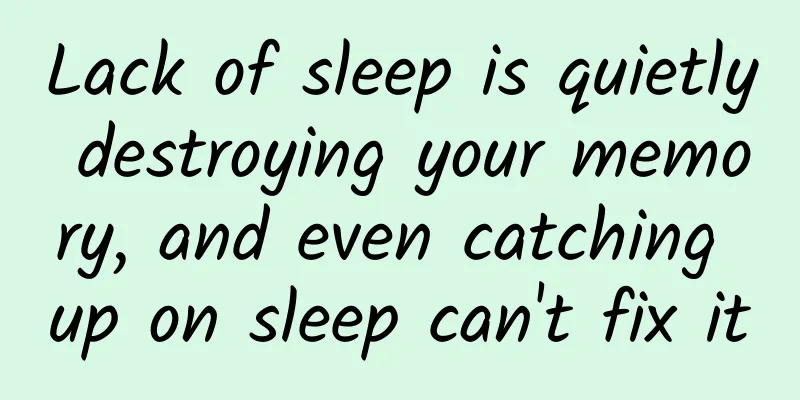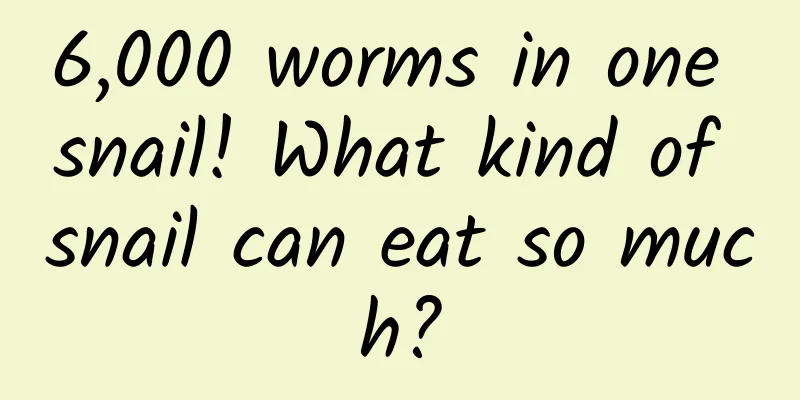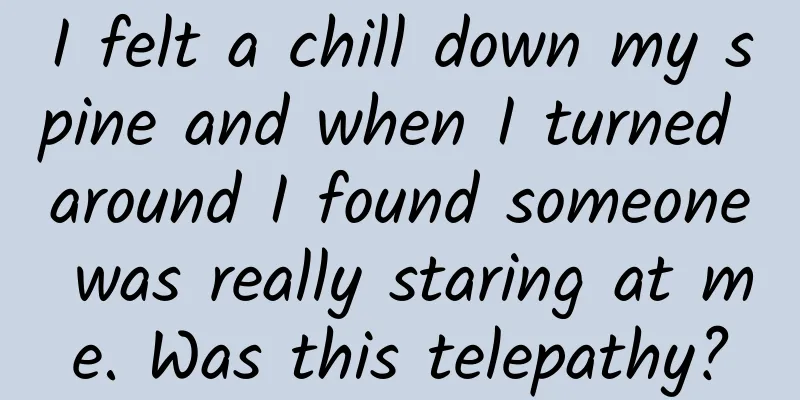Lack of sleep is quietly destroying your memory, and even catching up on sleep can't fix it

|
Image source: pixabay As early as the Roman era, the rhetorician and teacher Quintilian saw the close connection between sleep and memory: “It is a curious fact, the cause of which is not obvious, that the interval of one night greatly increases the strength of memory… This period of time, which is usually thought to cause forgetfulness, actually strengthens our memory.” Almost everyone who has heard the brain activity of animals during sleep will never forget the shock of that moment: after being amplified by a speaker, researchers often hear a burst of fierce and rapid "bang bang" sounds . Some people will compare it to "a burst of gunfire" or "a burst of fireworks", while others will think that an explosion occurred somewhere. In fact, what researchers hear is an electrical signal in the brain, or brain waves . In the 20th century, before more advanced imaging and data analysis technologies were invented, researchers converted processed electrical signals into audio signals and used sound to monitor the brain activity of animals in real time. Much of this monitoring takes place in rats, whose brains emit steady, rhythmic vibrations when awake, as they explore new environments. And when the rats are asleep, blasts from speakers often startle the sleepy human researchers on the other end of the device. Although researchers no longer have to suffer this, such sounds actually directly reflect the activity of the brain during sleep. This kind of brain wave is called "sharp-wave ripple", which is a violent, high-frequency (usually 100-250Hz) brain wave emitted by the hippocampus of the brain. Sharp wave ripples of different lengths (Image source: Matthew A. Wilson & Bruce L. Mcnaughton., 1994) Sharp Wave Ripples Current research has found that sharp wave ripples appear in two situations: one is when humans or animals are awake but in a relaxed and inactive state, especially when resting quietly after completing a task , which indicates that the brain is reviewing and processing memories related to the task; the other is in the third stage of non-rapid eye movement sleep (NERM), during which this brain wave plays a role in transferring memories from short-term storage (hippocampus) to long-term storage (cerebral cortex). More specifically, sharp wave ripples are the synchronous discharge of a group of neurons in the hippocampus of the brain, followed by the synchronous discharge of a second group of neurons, then the third group, the fourth group... Such signals spread out like water waves, conveying the memories acquired by the hippocampus during the day to the neocortex, fixing them as long-term memories. A classic rat experiment allows us to intuitively see how memories are formed during sleep: researchers put rats into a maze with food as a reward in a specific location. As the rats walk in the maze, we can see that different neurons in the hippocampus discharge in sequence, as if these neurons form a map in the brain. After the rats fell asleep, the researchers were surprised to find that during the rats' slow-wave sleep phase (part of NERM), these neurons in the brain were repeatedly discharging in the same order , but at a speed 10 to 20 times that of the day, as if the day's experiences were being replayed in the brain at an accelerated speed. These "double-speed replay" neuronal activities constitute sharp wave ripples. Image source: Global Science, April 2024 issue Subsequently, more and more studies have demonstrated the importance of sharp wave ripples to memory formation. When researchers interfered with the formation of sharp wave ripples, rats obviously had difficulty remembering their previous choices. Artificially extending the duration of sharp wave ripples during sleep significantly improved the performance of rats in the same memory task. "Research on sharp wave ripples to date has fully demonstrated the importance of sharp wave ripples during sleep, so we are naturally curious about how lack of sleep affects sharp wave ripples," said Kamran Diba, a researcher in the Neural Circuits and Memory Laboratory at the University of Michigan. Recently, a study published in Nature by Diba and his collaborators showed that lack of sleep reduces the quality of sharp wave ripples, thereby inhibiting the process of "replaying" memories in the brain. More importantly, this loss is difficult to recover even if you make up for it with sleep. Kamran Diba (Photo credit: Kamran Diba) The “window period” of memory This experiment still revolves around the activities of rats in the maze . Over a period of several weeks, Diba and his colleagues recorded the exploration process of seven rats in the maze and the activity of their hippocampus. After walking through the maze, some of the rats were able to get up to 9 hours of natural sleep. Also, like all evil researchers, the team “mildly” disturbed the sleep of other rats, reducing their sleep time by 5 hours and monitoring changes in the sharp wave ripples in their brains. "To our surprise, the frequency of sharp wave ripples was even higher during sleep deprivation than during deep sleep," said Diba. Mice that were repeatedly awakened had similar or even more frequent sharp wave ripples than those that slept normally. However, this did not mean that their memory became stronger. Image source: pixabay In fact, the research team found that the intensity of neuronal discharges in sleep-deprived rats would be weakened, resulting in sharp wave ripples that were lower in intensity and more chaotic. Most importantly, the neurons of these rats repeated their daytime activation patterns less frequently . In other words, lack of sleep affects the quality of sharp wave ripples, and quality is the key to turning short-term memories stored in the hippocampus into long-term memories. The researchers also found that after a lack of sleep, even if they made up for it, they could not make up for the loss of memory. After the researchers allowed the sleep deprivation group to resume normal sleep for 2 days, they observed that the quality of the sharp wave ripples had recovered, but it was difficult to reach the quality of the rats that had maintained normal sleep . It seems that after missing the "window period" for memory formation due to lack of sleep, catching up on sleep cannot restore the memory loss during this period, or even immediately restore the ability to convert short-term memory into long-term memory. The researchers wrote in the paper: "This is noteworthy because although most indicators of brain health and function, including protein signaling and gene transcription, can return to normal levels after adequate sleep, memories damaged by lack of sleep are usually not restored. " Complex effects As our understanding of sharp wave ripples continues to deepen, scientists have gradually realized that they actually play a very complex role in the process of memory formation. In March of this year, a study published in Science compared the frequency of sharp wave ripples in rats after performing tasks or encountering events and during sleep. It was found that those sharp wave ripples that occurred more frequently when awake were also replayed more frequently during sleep. This shows that sharp wave ripples are like labels, screening our daytime experiences and determining which ones can enter our long-term memory bank. "This finding is consistent with our conclusions," Diba said, "and is also consistent with another study we published in Nature in May." In this study, the research team found that sharp wave ripples not only replay information from the day, but also "predict" the next day's activities. "Therefore, lack of sleep may also impair the brain's ability to respond optimally to future experiences. " Diba said. Finally, the researchers offer some tips on memory: Q: So is it still useful to stay up late to study before an exam? A: If you cram last minute and get some sleep after reviewing, that might work. But the information that's vulnerable is the information learned earlier in the day. The brain's ability to buffer that information and retain it until you fall asleep becomes increasingly limited (as sleep pressure gets worse). References [1]https://www.nature.com/articles/s41586-024-07538-2 [2]https://www.nature.com/articles/s41586-024-07397-x [3]https://www.nature.com/articles/d41586-024-01732-y [4]https://www.science.org/doi/10.1126/science.adk8261 [5]https://www.nature.com/articles/nn.2384 [6]https://www.cell.com/neuron/fulltext/S0896-6273(02)01096-6 [7]https://www.science.org/doi/10.1126/science.8036517 [8]https://www.quantamagazine.org/in-brains-electrical-ripples-markers-for-memories-appear-20190806/ [9]https://news.rice.edu/news/2024/brain-rest-neurons-rehearse-future-experience Planning and production Source: Global Science (ID: huanqiukexue) Author: Erqi Editor: He Tong Proofread by Xu Lai and Lin Lin The cover image and the images in this article are from the copyright library Reprinting may lead to copyright disputes |
<<: How poisonous is this "poisonous bowl" that netizens are hotly discussing?
>>: Are whiter teeth better? It turns out that healthy teeth are this color
Recommend
Postpartum recovery: abdominal shaping after cesarean section
Postpartum repair and cesarean section abdominal ...
In the near future, five traditional industries may shine due to human-computer interaction learning
Over the years, machine learning has always been ...
Breaking news: A moving hairline does not necessarily mean hair loss!
"When you are young, you don't know how ...
Luo Rong: "Reshaping Financial Value and Enabling Business Growth"
Luo Rong's "Reshaping Financial Value an...
Don't set the alarm like this!!! It's more harmful than you think...
"Ding-ling-dang-dang~~~", every morning...
Preliminary preparation for developing e-commerce WeChat applet
With the development of intelligence, mobile e-co...
More than a year after the Black Soil Protection Law was implemented, what has happened to the "giant pandas" in the cultivated land?
Written by reporter Chen Yongjie Photo and text e...
"Six-dimensional Live Broadcast Startup" Complete video course + speech package (clothing, beauty, food, jewelry) + equipment list + Qianchuan courseware
"Six-dimensional Live Broadcast Startup"...
Spring Festival travel rush in progress | What can the security staff see when you go through security check? What should you do if there is radiation?
Audit expert: Meng Meng Associate Researcher, Ins...
Is it laggy or not? Experience with iPhone 4S, 5, 5S, and iPad 2 under iOS 9
The closed nature of the system allows old antiqu...
How to write a promotion plan for new media operations?
Introduction: How does a new media director write...
3 drainage principles to help you attract new customers efficiently
User growth is almost the ultimate proposition of...
If you are nearsighted, you won’t have presbyopia? Don’t be naive!
Author: Yan Xin, resident physician at Beijing To...
iOS 15 is no longer mandatory to upgrade, now you can’t go back after upgrading
Apple has previously pushed the official version ...
What is happiness? This question has been answered by many people. In fact, Aristotle has already given the answer
© The Collector Leviathan Press: Whenever we talk...









